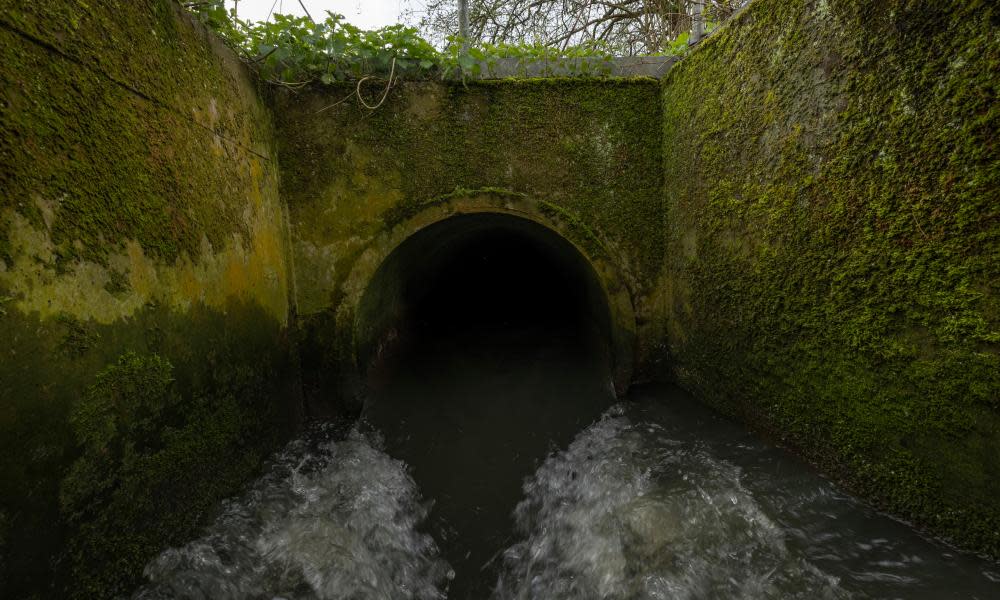Water companies criticised for passing £10bn sewage bill on to customers

The water industry’s promise to triple investment in the sewage system in England to reduce pollution and quell public anger should not be taken on trust, campaigners have said.
Clean water activists including surfers, swimmers and anglers criticised water companies for passing the £10bn bill for investment, which should have been carried out years ago, on to customers.
Anglian Water admitted that bills could rise by about £91 a year to fund the investment, saying: “The money does have to come from somewhere.”
Campaigners called for much tougher regulation to ensure that the promised investment in more than 350,000 miles of the sewage network would take place and would reduce pollution.
Feargal Sharkey, the former Undertones frontman and clean river campaigner, said customers would be paying again for investment that the companies should have been carrying out to fulfil their legal obligations. “We should have an apology for the suggestion they are going to put bills up by £10bn for their incompetence and their greed. This is nothing to celebrate,” he said.
Theo Thomas, of the group London Waterkeeper, said nothing should happen on trust alone. He said the industry was still pumping out false narratives that Victorian pipes were to blame, when two-thirds of London’s system was built after that time. “We need regulators to squeeze water companies so they have nowhere to hide. False narratives must be challenged. However much the monopolies choose to spend and add to our bills, we need an end to light-touch regulation. We need assertive scrutiny to make sure investment will see fewer sewer spills.”
England’s privatised water companies have paid out dividends of £2bn a year on average since they were given the utility debt free more than three decades ago. In 2022, water companies paid shareholders dividends of £1.4bn; up from £540m the previous year.
Any increased investment by water companies has to be approved by the regulator, Ofwat, which warned water companies on Friday that they would have to explain how their proposals would be funded, the impact it would have on customer bills, and their expected return to shareholders and lenders.
Ashley Smith of Windrush Against Sewage Pollution, who has been campaigning for six years to shed light on pollution of the River Windrush, said every year directors signed declarations that the companies were adequately funded to deliver the services required.
“Then they rake off dividends and bonuses and now we effectively have an apology for underinvestment – so the dividends and bonuses that were creamed off must have been eating into the money needed to sort out the capacity and legality issues exposed by campaigners,” he said.
“That money was taken in contravention of Ofwat licence terms, so we are less interested in an apology than we are in a refund to pay to fix the sewage scandal. This looks like a PR stunt to con the public into paying higher bills and also to get the government and regulators out of a hole of their own making.”
The Anglian Water spokesperson Regan Harris told the BBC bills could rise by £1.75 a week – or £91 a year – to pay for the investment, or a 10%-12% increase between now and 2030.
Doug Parr, the Greenpeace UK policy director, said the high-profile apology by the industry for sewage pollution would not cut any ice. “The promised £10bn is a start, but if it’s all charged on peoples’ bills whilst the shareholder dividends remain untouched, that would be a very strange way of being sorry.
“It should be clear by now that we can’t rely on the water firms’ goodwill to protect the health of our rivers and seas. Ministers should be all over this and force these companies to put the public’s good before shareholders’ profits.”
Yorkshire Water’s chief executive, Nicola Shaw, made a personal apology to customers in her area for sewage pollution in rivers. Campaigners from Ilkley Clean River – the first activists to secure bathing water status for part of a river in England, to drive a clean-up – welcomed her significant change in direction. The company has announced that it will invest £180m in the next two years, reducing discharges from 190 storm overflows, as well as the company’s largest environmental investment since privatisation planned for 2025-30.
Becky Malby of Ilkley Clean River said the work by Yorkshire Water would move much closer to storm overflows only operating in exceptional circumstances, by reducing raw sewage discharges to under 10 a year. “Ilkley will be benefiting not only from a radical reduction in raw sewage discharges into the Wharfe, but also from improved treatment of the treated sewage.”
But Malby said the actions of Yorkshire Water had to become a blueprint for all water companies. “No river should be sacrificed for profit; pollution must not pay. Ilkley has had to go to extraordinary lengths to deliver the water companies’ and regulators’ obligations to them,” she said.
The chief executive of Southern Water, Lawrence Gosden, joined four other water bosses this week in announcing that he would forgo his bonus for not meeting the expectations of customers over sewage pollution in another public mea culpa by the industry.

 Yahoo News
Yahoo News 
